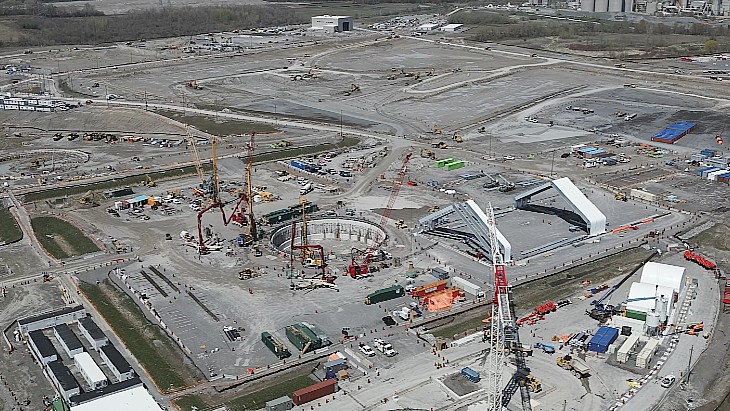UK sees steady income from decommissioning work
The UK's Nuclear Decommissioning Authority (NDA) received more than GBP1.0 billion ($1.3 billion) of commercial income in the 2016/2017 financial year, which it says reduced the "net impact on the public purse" to GBP2.2 billion. According to its annual report and accounts, published yesterday, the exact figure was GBP1.025 billion, which was down from GBP1.094 billion in 2015/2016. Around 85% of its income, GBP612 million, came from the reprocessing and management of used fuel and waste.
The NDA, a non-departmental public body that reports to the Department for Business, Energy and Industrial Strategy, spent just over GBP3.2 billion in the period, including GBP100 million to settle legal action over a contract awarded in 2014.
Headquartered in west Cumbria, England, it is responsible for decommissioning 17 nuclear sites across the UK. Its estate includes the first generation of Magnox power stations, various research and fuel facilities and its largest, most complex site, Sellafield. Its core objective is to decommission these sites safely, securely, cost-effectively and in a manner that protects the environment.
In his first blog after becoming NDA chief executive in March, David Peattie said publishing its annual report is "much more than a legal requirement".
"For me, it's an opportunity to let people know how we're doing - being open about our financial performance and the progress we're making against our mission to decommission and clean up the UK's 17 earliest nuclear sites," he said yesterday.
The NDA said in March it had decided to terminate its contract with Cavendish Fluor Partnership (CFP) for the management and decommissioning of 12 redundant Magnox sites, including two research sites. CFP's contract will be terminated in September 2019, after five years rather than its full term of 14 years. The NDA concluded legal proceedings relating to claims over the placing of this contract, agreeing commercial settlements with EnergySolutions and Bechtel.
Despite GBP100 million in legal and settlement costs arising from the "Magnox litigation", Peattie said yesterday the NDA had stayed within its allocated budget of GBP3.3 billion.
"When talking about finances, it would be remiss of me to not mention the costs we had to cover as a result of the EnergySolutions and Bechtel claims against the NDA, for loss of potential earnings and legal costs over the placing of the Magnox contract," he said. "Whilst we managed to accommodate the GBP100 million within our budget, thanks to careful financial management and more efficient working across the whole estate, we can't view the costs as anything other than disappointing."
He added: "Although overall savings arising from the contract outweigh the GBP100 million, any unnecessary burden on the taxpayer is wrong. On joining the NDA, my immediate priority was to resolve this issue. Now, it's about learning lessons from the ongoing independent inquiry and moving the organisation forward to ensure this doesn't happen again."
The NDA's decision to make Sellafield Ltd an NDA subsidiary is "reaping financial benefits for the taxpayer", he said. "I'm in no doubt that this change is enabling the Sellafield Ltd management and workforce to deliver work more efficiently, resulting in a saving of more than GBP200 million last year," he added.
The cost of running the NDA itself was stable at GBP38 million, which is 1.3% of the overall budget. Some 60% of its spending was at Sellafield.
Litigation
NDA Chairman Tom Smith said in the report that the Board was "greatly disappointed" that a high court judgment in July 2016 had found the authority had acted unlawfully in the course of the competition to appoint a new parent body organisation for the Magnox sites. The Board decided that the legal actions brought by EnergySolutions EU Ltd (now called ATK Energy EU Ltd) and Bechtel were "best settled out of court", to avoid the risk of prolonged and potentially more damaging litigation.
"We had the full support of Government in this and reached a full and final settlement of both claims in March 2017. This has drawn a line under the issue, but at a cost of around GBP100 million to the public purse, which we greatly regret," Smith said.
Separately from the litigation, it became apparent over the course of the year that the Magnox contract awarded to CFP was "at risk of legal challenge", he said. This is because its scope and value had become "materially different" from that anticipated at the time of award. To avert the risk of further financial exposure to the taxpayer, the Board decided to terminate the contract, with the support of Government and CFP, he added.
The events around the Magnox competition and contract are now the subject of an independent inquiry, he noted. "We will cooperate with it," he said, and the NDA "will emerge a stronger and better organisation".
Context
David Batters, the NDA's chief financial officer and estate program director, noted the importance of reviewing the authority's performance in context. "It is essentially a snapshot of one year in a 100+ year program of activity," he said.
"The complexity of the critical projects at Sellafield, which are often at a relatively early stage in both design and delivery, mean that there is inherent uncertainty in both the cost and schedule for the necessary work. There is more stability in the cost estimates across the Magnox sites and at Dounreay. Nevertheless, there has been an overall increase of GBP1.6 billion in the undiscounted cost of completing the NDA mission," he said.
The way in which the NDA contracts for delivery of work has changed significantly this year, he added, with Sellafield becoming a subsidiary of the NDA from April 2016. Consequently, there has been a substantial reduction this year in fees paid to Parent Body Organisations.
"All expenditure has been focused on improvements in the operation of the site resulting from the change. Work is under way to procure specialist support to help the management of the site in delivery of key programs and projects," he said. "We continue to drive value for money in our own expenditure, with the cost of running the NDA itself remaining below GBP40 million (or 1.2% of the overall NDA budget) and continued investment in research and socio-economic initiatives. The spending review settlement required a commitment from the NDA to deliver efficiency savings of GBP1 billion, and it is pleasing to say that good progress is being made towards achievement of that target," he added.
Major milestones
After years of preparation, Sellafield Ltd is getting ready to take waste out of the oldest and most hazardous silos, and is removing, treating and safely storing radioactive waste from two legacy storage ponds on the site, Peattie noted. In March, the Office for Nuclear Regulation approved the cutting of six access holes in the Pile Fuel Cladding Silo at the site.
Over the next couple of years, the primary focus at Sellafield will increasingly be clean-up and decommissioning, as the site moves nearer to the planned cessation of fuel reprocessing. Excellent operational performance levels at the THORP and Magnox Reprocessing plants last year mean that they are on track to close in 2018 and 2020 respectively, as set out in the NDA Strategy, he said.
Meanwhile, progress continues at its 12 Magnox sites around the UK, he added.
Peattie visited the Bradwell site, in Essex, earlier this year and "saw what great strides are being made towards reaching its 'care and maintenance' phase" in 2019. Bradwell will be the first Magnox site to reach this state when the vast majority of the radiological and conventional hazards have been removed from the site, and existing buildings left in-situ while any remaining radioactivity naturally decays.
Only two Magnox plants are now left to defuel. Calder Hall at Sellafield passed the point of having 50% of its fuel removed late last year, while Wylfa in Wales successfully overcame some mechanical issues before progressing. By 2019, defueling will be completed at both sites.
The report noted that a ten-year program at another priority facility in the estate, the Dounreay Fast Reactor, in Scotland, had concluded. Toxic sodium potassium alloy used to cool the reactor has been successfully destroyed, while the last of the higher activity liquid - generated by reprocessing the reactor fuel - has been grouted into drums for safe long-term storage.
This year also saw the NDA's nuclear archive, Nucleus, open in Wick near Dounreay. This state-of-the-art facility will become home to important nuclear records from across the whole of the estate, Peattie said. A five-year project has begun which will see thousands of plans, photographs, drawings and many millions of electronic records transferred to Nucleus.
Researched and written
by World Nuclear News
_59102.jpg)
_77790.png)
.jpg)
_49833.jpg)







